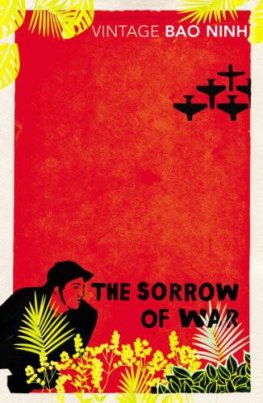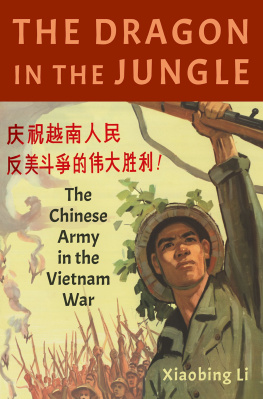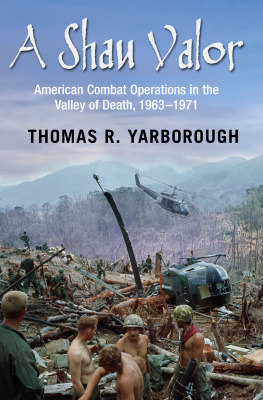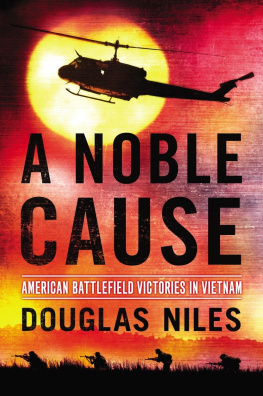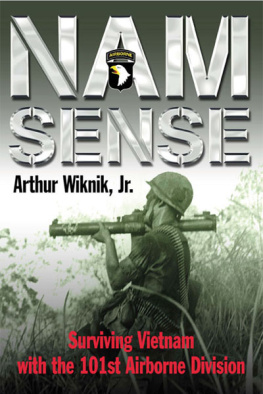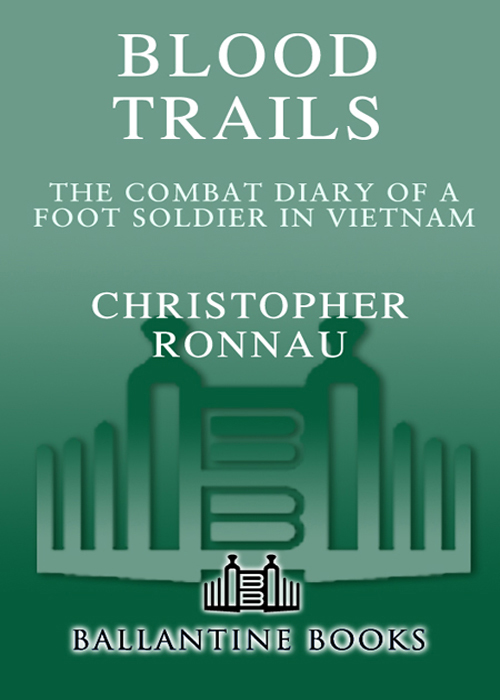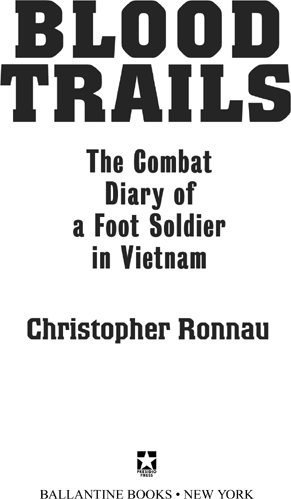Books published by The Random House Publishing Group are available at quantity discounts on bulk purchases for premium, educational, fund-raising, and special sales use. For details, please call 1-800-733-3000.
To my mom and dad, of course. Also, to the gold-star moms and dads of America who had it worse off than any doughboy, dogface, or grunt could even imagine.
Authors Note
My military service in Vietnam is a source of great pride for me. I am very thankful for the diary I kept while in Indochina. It has turned out to be one of my most cherished possessions.
The diary helps me keep my memories of Vietnam based in reality. At every Black Lion reunion Ive attended, there seems to be a significant display of faulty-memory syndrome. The decades have corroded all our memories, including mine, to the point that we disagree on so much that if you listened to our conversations you would wonder if we were talking about the same war. Without the written contemporaneous account of my activities in the diary, I am sure that I would no longer remember many of the events of 1967 and would have erroneous memories of others.
Unfortunately, the diary is jammed with numerous derogatory terms for various racial groups as well as some negative comments about gays. Mea culpa. They are the product of my incomplete social development at the time. Thats the way eighteen- to twenty-one-year-old infantrymen spoke back then. Fortunately, I have grown and now live beyond those thoughts and comments. I would be mortified if my children ever heard me speak that way. They never have.
The negative comments have not been expurgated from this text because it would not be historically accurate to do so. To anyone who is offended, which is not my intent, please accept my apologies.
Some of the names in this book have been changed.
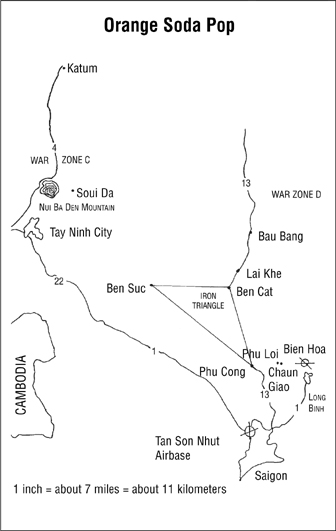
JANUARY
For me, Vietnam was better than a poke in the face with a sharp stick. I got a lot out of it. I grew there. However, not knowing this ahead of time dampened my enthusiasm so that when it came time to go, I didnt, at least not right away. Earlier there had been more eagerness in my effort. I didnt like the giant global monolith that was communism and, like the hawks in our government, I believed in former president Eisenhowers domino theory. If one small country in Southeast Asia fell to the Red Menace, the others would soon follow suit, falling like a row of dominos and then everyone involved would be miserable.
Wanting to do my share, I volunteered for the army. In what can only be described as a monumental attack of nearly terminal stupidity, I enlisted only after being guaranteed an assignment to an infantry unit. My misguided fear was that the few Cs and Ds that I had managed to earn in classes at Long Beach City College might get me a clerical job or some other behind-the-scenes position. That wouldnt do. I wanted to see some action.
In Gone With the Wind, a bunch of ignorant and naive southern boys rode off from Ashley Wilkess plantation, Twelve Oaks, to join the Confederate States Army when war is declared between the states. As they ride off they are all hollering rebel yells in excitement and anticipation of the glories of combat that will surely soon follow. Like them, I didnt want to miss the war, to let it pass me by. I had joined the infantry so that I would see combat. Such was the state of my adolescent mind. It was not a well thought-out plan.
After four months of basic training and advanced infantry training, the army was beginning to seem more real. My departure date for assignment to a combat unit interfered with my earlier sophomoric brain patterns and made me slightly less enthusiastic about leaving exactly on time. As it turned out, the impending proceedings were temporarily interrupted by my sister. She had acquired student tickets to the Rose Bowl, which was on my departure date, New Years Day 1967. There we saw Purdue defeat Southern California.
Southern Cal in the Rose Bowl was worth going AWOL for; that couldnt be missed. My thinking was that the army was so desperate for fresh troops that they wouldnt dare lock me up. The worst they could do was send me to Vietnam and that was already happening. When my bus arrived at the Oakland Alameda Naval Air Station no one even mentioned the fact that I was three days late.
There were thousands of GIs stationed there awaiting transportation. For a few days we were housed in giant warehouses with nothing but rows of metal bunks and chairs. It was frightfully boring. Most of the stay was an exercise in the time-honored military tradition of hurry up and wait.
We did, however, get our immunizations updated while walking a medical gauntlet between two rows of army medics carrying air-powered vaccination guns. They simultaneously blasted us numerous times in both arms as we passed by. When it was over my shot card showed that I was then up to date for typhus, influenza, bubonic plague, smallpox, cholera, typhoid, tetanus, and yellow fever. How could people live in a country with this much sickness? Who would want to?
The vaccination guns made a loud hissing noise when fired and left a visible welt that felt like a jellyfish sting. The experience was slightly unnerving. One guy flinched so wildly that he got one injection in the armpit. We all howled with laughter.
After processing we were sent to Travis Air Force Base outside Oakland, California. So many planes swooped in and out of there in those days that soon, like the dingy gray seagulls that were everywhere, you just didnt notice them anymore. Like most servicemen headed for Vietnam we traveled by commercial airliner. My flight was a Continental Airlines seven something seven, complete with stewardesses and a meal. There were no civilian passengers and there was no movie. The flight was so boring and so long, more than twenty hours, that a single movie would not have saved us. That would have taken at least the entire Cannes Film Festival.
After a number of hours of flying we landed to refuel in Honolulu, where we were allowed off the plane for forty minutes to stretch out legs and walk around in a restricted section of the airport. It was sad to be in paradise without being allowed to experience it. I didnt see any of the tourist spots, sample their seafood, or even have a drink. It was pathetic. The highlight of my trip to Hawaii was shooting down a fly in the urinal of an airport restroom. However, from then on I could answer in the affirmative if anyone asked me had I ever been to Hawaii. Just dont ask to see my snapshots of the trip.
Halfway between Hawaii and Vietnam, the pilot came on the intercom to give us the cheery news that the local Viet Cong, in celebration of our arrival, had blown up the runway at Pleiku, our destination, with mortar fire. Accordingly, our flight was being temporarily diverted to the Philippine Islands. We were going to Clark Air Force Base near Manila to wait until the runway was repaired.
As soon as we landed, two sourpuss MPs came on board to tell us that we could sit on the plane or get off and stand in a hangar. Theres no smoking, the taller of the two barked loudly, and no goddamn wandering off because we dont want to have to come and look for you. Descending the metal stairs, it was impossible not to see the sleek, majestic A-12 Blackbird spy plane parked next to us. About this time, the taller MP added, almost as an afterthought, And no picture taking, because that plane doesnt exist, so we dont want any goddamned photographs of it. This was immediately followed by a chorus of clicking cameras so numerous that it sounded as if the crickets had come out.


